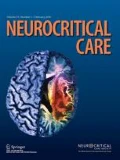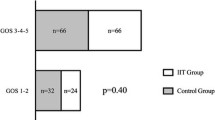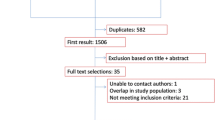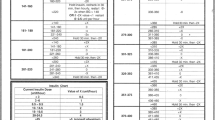Abstract
Background
To evaluate the safety and efficiency of a protocol for glycemic control in intensive care unit (ICU) patients with neurovascular or head injury.
Methods
Two cohorts of 50 consecutive patients admitted to the ICU with an admission diagnosis of neurovascular or head injury before and after protocol implementation were evaluated. All patients in the interventional cohort received insulin using a standardized intravenous insulin infusion protocol targeting blood glucose levels of 7–9 mmol/l. Efficiency (time to reach and time within target range), safety (hypoglycemia), and nursing compliance (protocol violations) were evaluated.
Results
The median time to reach the target blood glucose range was shorter in the interventional cohort than the conventional cohort (5.0 h [0.5–20.5 h] vs. 12.9 h [1.3–90.3 h]; P < 0.001). More time was spent within target range in the interventional cohort than in the conventional cohort (36.4 ± 16.3% vs. 27.1 ± 19.0%; P < 0.001). The median prevalence of mild (<4.9 mmol/l) hypoglycemia (0 [0–1.11]% vs. 0.58 [0–2.79]%; P < 0.001) and moderate (<3.9) hypoglycemia (0[0–0.55]% vs. 0 [1–1.25]%; p < 0.001) was significantly lower in the interventional cohort.
Conclusions
The intravenous insulin infusion protocol improved the safety and efficiency of glycemic control for ICU patients with neurovascular or head injury.
Similar content being viewed by others
References
Van den Berghe G, Wouters P, Weekers F, Verwaest C, Bruyninckx F, Schetz M, et al. Intensive insulin therapy in the critically ill patients. N Engl J Med. 2001;345(19):1359–67.
Van den Berghe G, Wilmer A, Hermans G, Meersseman W, Wouters PJ, Milants I, et al. Intensive insulin therapy in the medical ICU. N Engl J Med. 2006;354(5):449–61.
Brunkhorst FM, Engel C, Bloos F, Meier-Hellmann A, Ragaller M, Weiler N, et al. Intensive insulin therapy and pentastarch resuscitation in severe sepsis. N Engl J Med. 2008;358(2):125–39.
Devos P, Preiser JC, Melot C, On behalf of the Glucontrol Steering Committee. Impact of tight glucose control by intensive insulin therapy on ICU mortality and the rate of hypoglycemia: final results of the Glucontrol study. Intensive Care Med. 2007;33:S189. (abstract).
Finfer S, Chittock DR, Su SY, Blair D, Foster D, Dhingra V, et al. Intensive versus conventional glucose control in critically ill patients. N Engl J Med. 2009;360(13):1283–97.
Bruno A, Biller J, Adams HP Jr, Clarke WR, Woolson RF, Williams LS, et al. Acute blood glucose level and outcome from ischemic stroke. Trial of ORG 10172 in Acute Stroke Treatment (TOAST) Investigators. Neurology. 1999;52(2):280–4.
Capes SE, Hunt D, Malmberg K, Pathak P, Gerstein HC. Stress hyperglycemia and prognosis of stroke in nondiabetic and diabetic patients: a systematic overview. Stroke. 2001;32(10):2426–32.
Frontera JA, Fernandez A, Claassen J, Schmidt M, Schumacher HC, Wartenberg K, et al. Hyperglycemia after SAH: predictors, associated complications, and impact on outcome. Stroke. 2006;37(1):199–203.
Gentile NT, Seftchick MW, Huynh T, Kruus LK, Gaughan J. Decreased mortality by normalizing blood glucose after acute ischemic stroke. Acad Emerg Med. 2006;13(2):174–80.
Jeremitsky E, Omert LA, Dunham CM, Wilberger J, Rodriguez A. The impact of hyperglycemia on patients with severe brain injury. J Trauma. 2005;58(1):47–50.
Rovlias A, Kotsou S. The influence of hyperglycemia on neurological outcome in patients with severe head injury. Neurosurgery. 2000;46(2):335–42.
Vogelzang M, Nijboer JM, van der Horst I, Zijlstra F, ten Duis HJ, Nijsten MW. Hyperglycemia has a stronger relation with outcome in trauma patients than in other critically ill patients. J Trauma. 2006;60(4):873–7.
Diringer MN. Is aggressive treatment of hyperglycemia for everyone? Crit Care Med. 2006;34(3):930–1.
Strong AJ, Boutelle MG, Vespa PM, Bullock MR, Bhatia R, Hashemi P. Treatment of critical care patients with substantial acute ischemic or traumatic brain injury. Crit Care Med. 2005;33(9):2147–9.
Vespa P, Boonyaputthikul R, McArthur DL, Miller C, Etchepare M, Bergsneider M, et al. Intensive insulin therapy reduces microdialysis glucose values without altering glucose utilization or improving the lactate/pyruvate ratio after traumatic brain injury. Crit Care Med. 2006;34(3):850–6.
Cryer PE. Hypoglycemia, functional brain failure, and brain death. J Clin Invest. 2007;117(4):868–70.
Kanji S, Singh A, Tierney M, Meggison H, McIntyre L, Hebert P. Standardization of intravenous insulin therapy improves the efficiency and safety of blood glucose control in critically ill adults. Intensive Care Med. 2004;30(5):804–10.
Griesdale DE, de Souza RJ, van Dam RM, Heyland DK, Cook DJ, Malhotra A, et al. Intensive insulin therapy and mortality among critically ill patients: a meta-analysis including NICE-SUGAR study data. CMAJ. 2009;180(8):821–7.
Van den Berghe G, Schoonheydt K, Becx P, Bruyninckx F, Wouters PJ. Insulin therapy protects the central and peripheral nervous system of intensive care patients. Neurology. 2005;64(8):1348–53.
Gray CS, Hildreth AJ, Sandercock PA, O’Connell JE, Johnston DE, Cartlidge NE, et al. Glucose-potassium-insulin infusions in the management of post-stroke hyperglycaemia: the UK Glucose Insulin in Stroke Trial (GIST-UK). Lancet Neurol. 2007;6(5):397–406.
Bilotta F, Caramia R, Cernak I, Paoloni FP, Doronzio A, Cuzzone V, et al. Intensive insulin therapy after severe traumatic brain injury: a randomized clinical trial. Neurocrit Care. 2008;9(2):159–66.
Krinsley JS, Preiser JC. Moving beyond tight glucose control to safe effective glucose control. Crit Care. 2008;12(3):149.
Acknowledgments
ICU nurses, physicians, pharmacists and staff at The Ottawa Hospital; The Ottawa Hospital Pharmacy Research Committee; Nikki O’Brien, The Ottawa Hospital Institute for Patient Safety.
Financial Support
This study was funded by the Centre for Patient Safety, The Ottawa Hospital.
Author information
Authors and Affiliations
Corresponding author
Appendix I
Appendix I
Insulin Infusion Protocol for Patients with Neurovascular or Head Injury

Rights and permissions
About this article
Cite this article
Kanji, S., Jones, E., Goddard, R. et al. Efficiency and Safety of a Standardized Protocol for Intravenous Insulin Therapy in ICU Patients with Neurovascular or Head Injury. Neurocrit Care 12, 43–49 (2010). https://doi.org/10.1007/s12028-009-9275-z
Received:
Accepted:
Published:
Issue Date:
DOI: https://doi.org/10.1007/s12028-009-9275-z




